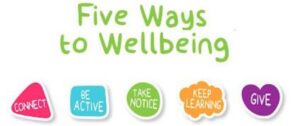350 Careers. Your NHS and Care. Your Future.




Volunteering is any activity that involves willingly giving time, unpaid, doing something that aims to benefit people or the environment.
Every day of every year thousands of volunteers make an incredible contribution to improving our health and well-being. It’s estimated there are over 10,000 charities and voluntary service organisations across Lancashire and South Cumbria.
Volunteers come from a huge range of backgrounds and reflect the diversity of our communities. If you want to gain useful experience while job hunting or if you want to support career development in health and social care, volunteering can really make a difference for you and to the services we deliver.
Please click here, to see a short video showing the many ways you could benefit from Volunteering.

Evidence suggests there are 5 steps you can take to improve your mental health and wellbeing. Trying these things could help you feel more positive and able to get the most out of life. Volunteering is an excellent way of achieving all of these and improving your wellbeing!
Volunteering increases self-confidence. Volunteering can provide a healthy boost to your self-confidence, self-esteem, and life satisfaction. You are doing good for others and the community, which provides a natural sense of accomplishment. Your role as a volunteer can also give you a sense of pride and identity.
Volunteering can make a real difference to your own life and the lives of those around you. It improves and strengthens local communities and can have a transformative effect for those who are recipients of support from volunteers.
Benefits include:
To find out more about this click here to read the NHS five steps to mental health wellbeing.
Want to know more?
Here is an example from Active Lancashire about the ‘Chorley Activity Buddies’ initiative, which highlights such positive impact and outcomes.
There is no legal reason why young people age 16 and 17 years cannot volunteer, however children are classed as a ‘vulnerable group’, so any organisation who takes on young volunteers must be careful to protect them. Legally a child is defined as someone who is under 18 years old, or under 16 if employed.
Spending some time with elders or vulnerable adults can be very meaningful for under 16 year-olds. Preteens can volunteer but of course with adult supervision and in suitable safe environments. Learning the ethos of giving and helping others at a young age can help build character. Most organisations will have their own policy.
It is rare to need qualifications, but your skills, knowledge and experience will usually be of great interest to organisations. Sometimes they need specialist know-how like digital skills, including social media, project or time management, communication skills or finance and budgets and always they will look for sensitivity and discretion with personal information. Organisational skills are always useful too.
Usually your name and address and other details depending on what you are volunteering to do. They might need proof of your age or check your health for physically demanding roles. They will need to check your driving licence if you will be volunteer driving and also that your vehicle is road worthy. Organisations must treat your information in line with GDPR requirements and explain why they need information, how it will be stored and so on.
Charities, community groups and non-profit organisations such as Age UK, Barnardo’s, British Red Cross, Cancer Research UK, the National Trust, The Prince’s Trust, and many more are in constant need of volunteers. You can also work in schools, hospitals and local community centres. Volunteering is possible in most roles, however, some organisations require experience and knowledge, so make sure you do some research before applying.
There are many ways and places you can volunteer locally across Lancashire & South Cumbria and beyond. They include: